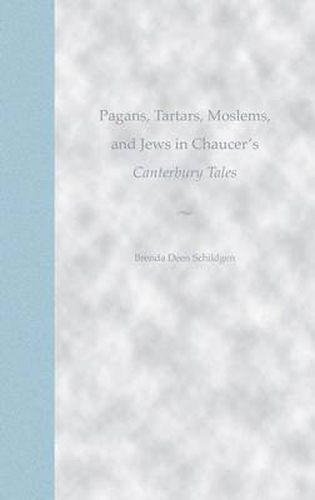Readings Newsletter
Become a Readings Member to make your shopping experience even easier.
Sign in or sign up for free!
You’re not far away from qualifying for FREE standard shipping within Australia
You’ve qualified for FREE standard shipping within Australia
The cart is loading…






Brenda Deen Schildgen takes a new path in Chaucer studies by examining the
Canterbury Tales
set outside a Christian-dominated world - tales that pit Christian teleological ethics and history against the imagined beliefs and practices of Moslems, Jews, pagans, and Chaucer’s contemporaries, the Tartars. Schildgen contends that these tales - for example the Knight’s, Squire’s and Wife of Bath’s - deliberate on the grand rifts between the Christian or pagan past and Chaucer’s present and between other cultural worlds and the Latin Christian world. They offer philosophical views about what constitutes
wisdom
and
lawe
while exploring alternative moral atitudes to the Christian mainstream of Chaucer’s time. She argues that their presence in the
Canterbury Tales
testifies to Chaucer’s literary secularism and reveals his expansive narrative interest in the intellectual and cultural worlds outside Christianity. Making impressive use of mediaeval intellectual history, Schildgen shows that Chaucer framed his tales with the diverse philosophies, religions and ethics that coexisted with Christian ideology in the late Middle Ages, a framework that emerges as political and not metaphysical, putting these beliefs deliberately in the context of literary discourse, where their validity can be accepted or dismissed and, most important, debated.
$9.00 standard shipping within Australia
FREE standard shipping within Australia for orders over $100.00
Express & International shipping calculated at checkout
Brenda Deen Schildgen takes a new path in Chaucer studies by examining the
Canterbury Tales
set outside a Christian-dominated world - tales that pit Christian teleological ethics and history against the imagined beliefs and practices of Moslems, Jews, pagans, and Chaucer’s contemporaries, the Tartars. Schildgen contends that these tales - for example the Knight’s, Squire’s and Wife of Bath’s - deliberate on the grand rifts between the Christian or pagan past and Chaucer’s present and between other cultural worlds and the Latin Christian world. They offer philosophical views about what constitutes
wisdom
and
lawe
while exploring alternative moral atitudes to the Christian mainstream of Chaucer’s time. She argues that their presence in the
Canterbury Tales
testifies to Chaucer’s literary secularism and reveals his expansive narrative interest in the intellectual and cultural worlds outside Christianity. Making impressive use of mediaeval intellectual history, Schildgen shows that Chaucer framed his tales with the diverse philosophies, religions and ethics that coexisted with Christian ideology in the late Middle Ages, a framework that emerges as political and not metaphysical, putting these beliefs deliberately in the context of literary discourse, where their validity can be accepted or dismissed and, most important, debated.